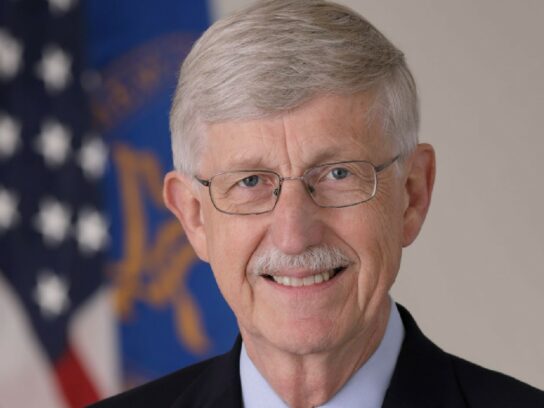
Dr. Francis Collins will step down from his position as Director of the National Institutes of Health (NIH) in Bethesda by the end of the year. Originally nominated by former President Barack Obama, Collins has led the NIH since 2009.
“It has been an incredible privilege to lead this great agency for more than a decade,” Collins wrote in a news release. “I love this agency and its people so deeply that the decision to step down was a difficult one, done in close counsel with my wife, Diane Baker, and my family. I am proud of all we’ve accomplished.”
Collins, 71, added, “I fundamentally believe, however, that no single person should serve in the position too long, and that it’s time to bring in a new scientist to lead the NIH into the future. I’m most grateful and proud of the NIH staff and the scientific community, whose extraordinary commitment to lifesaving research delivers hope to the American people and the world every day.”
Collins is a physician-geneticist who served as the director of the National Human Genome Research Institute from 1993 to 2008. There he led the international Human Genome Project, which sequenced the human DNA instruction book. He also launched the Brain Research through Advancing Innovative Neurotechnologies Inititative, which developed technologies to understand the neuronal networks of the brain and what goes wrong to cause such brain diseases as Alzheimer’s, schizophrenia and psychosis.
He helped launch the Cancer Moonshot Initiative to speed new treatments and reduce cancer incidence and improve patient outcomes. He also has been influential in Helping to End Addiction Long-Term and responding to the COVID-19 pandemic.
Known for his love of motorcycles and playing guitar, Collins led NIH for 12 years, growing its budget by 38% to this year’s $41.3 billion.
President Joe Biden called Collins “one of the most important scientists of our time.” In a news release, Biden noted that since he was a senator from Delaware, “I got to truly know him, trust him, and lean on him.”
In a news release, Biden said, “Millions of people will never know Dr. Collins saved their lives. Countless researchers will aspire to follow in his footsteps. And I will miss the counsel, expertise, and good humor of a brilliant mind and dear friend.”
Health and Human Services Secretary Xavier Becerra also praised Collins. “Few people could come anywhere close to achieving in a lifetime what Dr. Collins has at the helm of NIH.” Becerra said in a news release. “It takes an extraordinary person to tackle the biggest scientific challenges facing our nation — and under three presidents, amidst three distinctly different chapters of American history. Dr. Collins, master of scientific breakthroughs and scientific reason — from mapping the human genome to fighting the most devastating pandemic of a century — has routinely broken ground to save countless lives, while unleashing innovation to benefit humanity for generations to come.”
Collins also tackled such issues as sexual harassment and structural racism by enhancing accountability and transparency in clinical trials and data sharing. As director, Collins oversees all of NIH’s departments including the National Institute of Allergy and Infectious Diseases (NIAID) headed by Dr. Anthony Fauci.
While stepping down from the top position at NIH, Collins said he will continue to lead his research laboratory at the National Human Genome Research Institute, which currently is working on type 2 diabetes and premature aging.
He is NIH’s 16th director and recipient of the Templeton Prize, which celebrates scientific and spiritual curiosity.
It's been a privilege & honor to serve as #NIH Director for over 12 years. However, I believe no person should hold this position for too long. So with deep gratitude to this great agency & the people who carry out its mission, I've decided to step down. https://t.co/rwUnKiW3V5
— Dr. Monica M. Bertagnolli (@NIHDirector) October 5, 2021


Comments are closed.